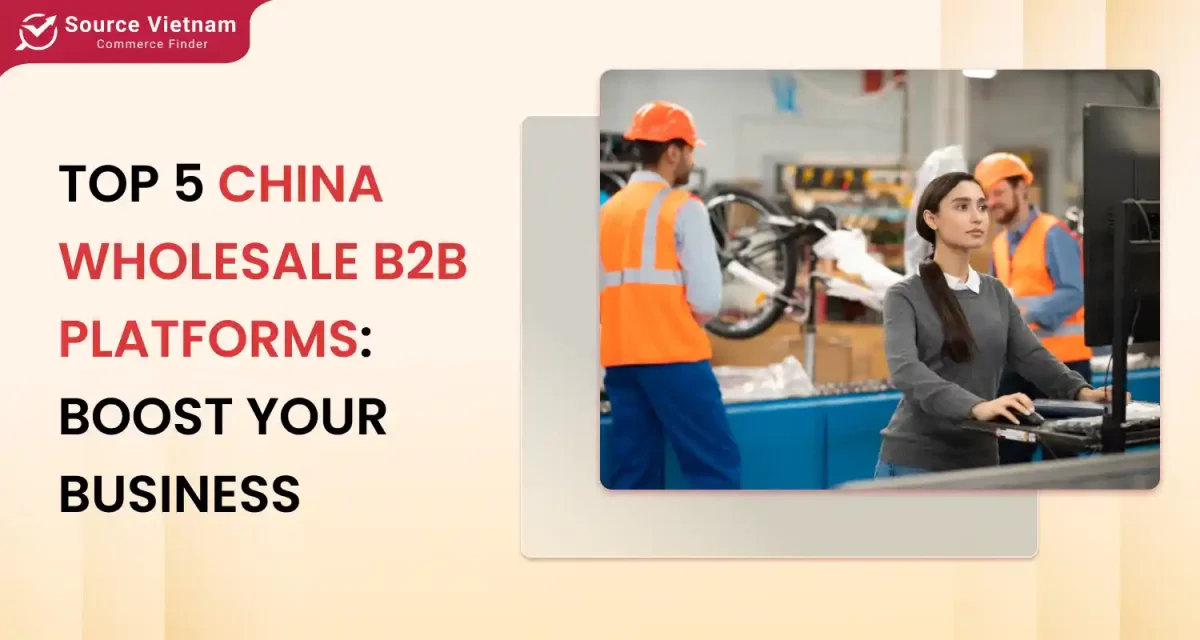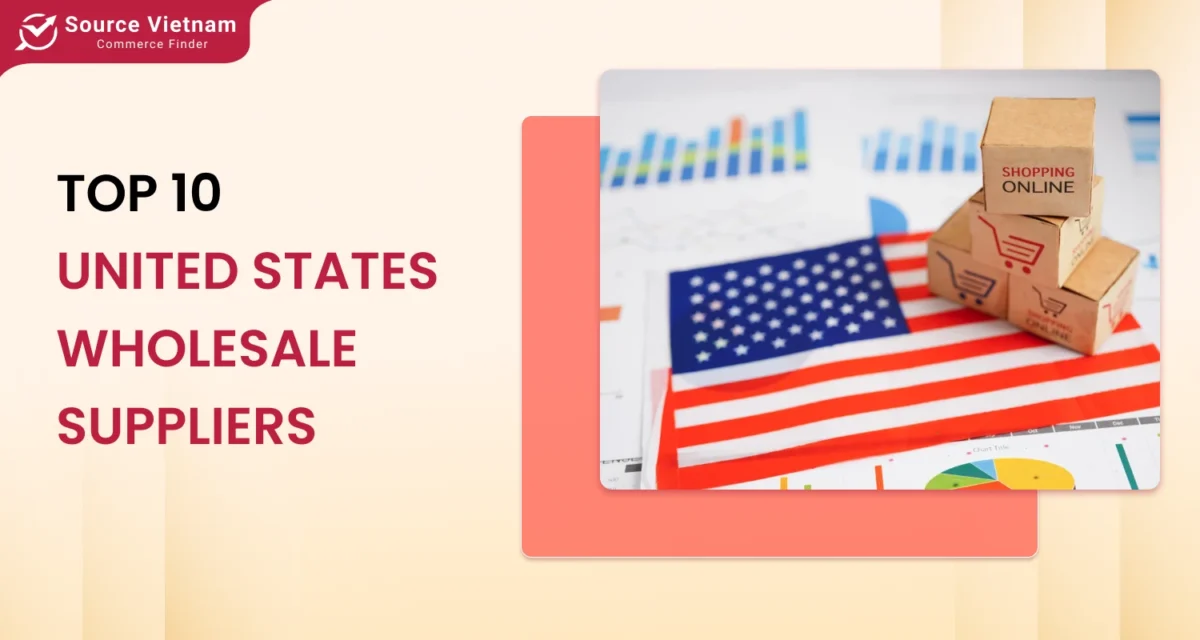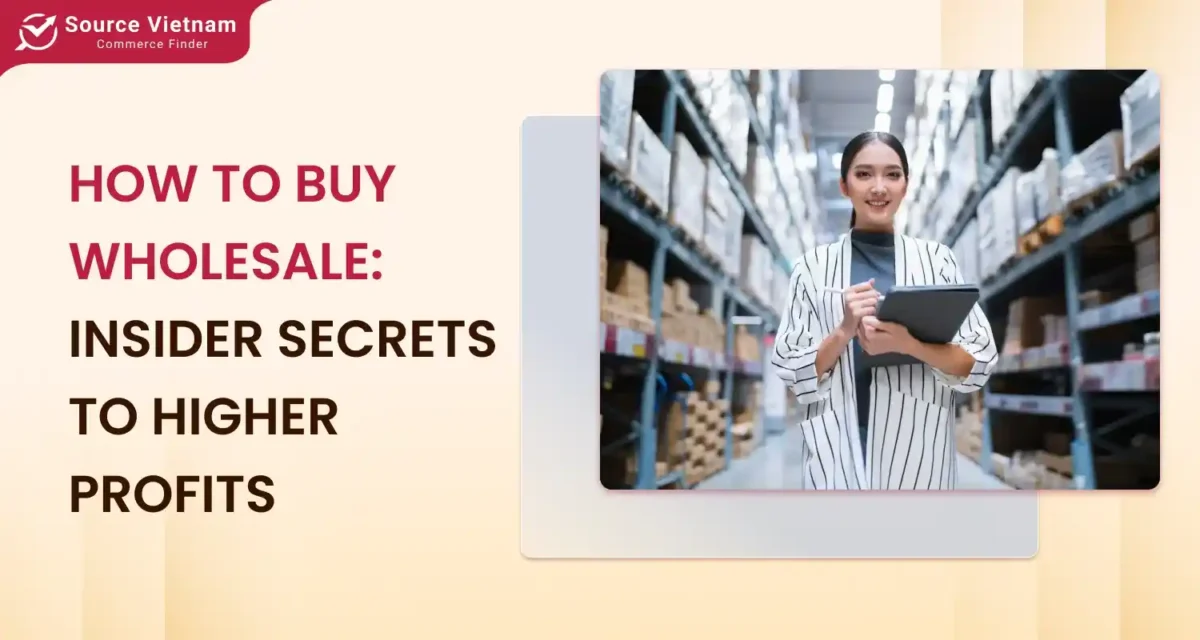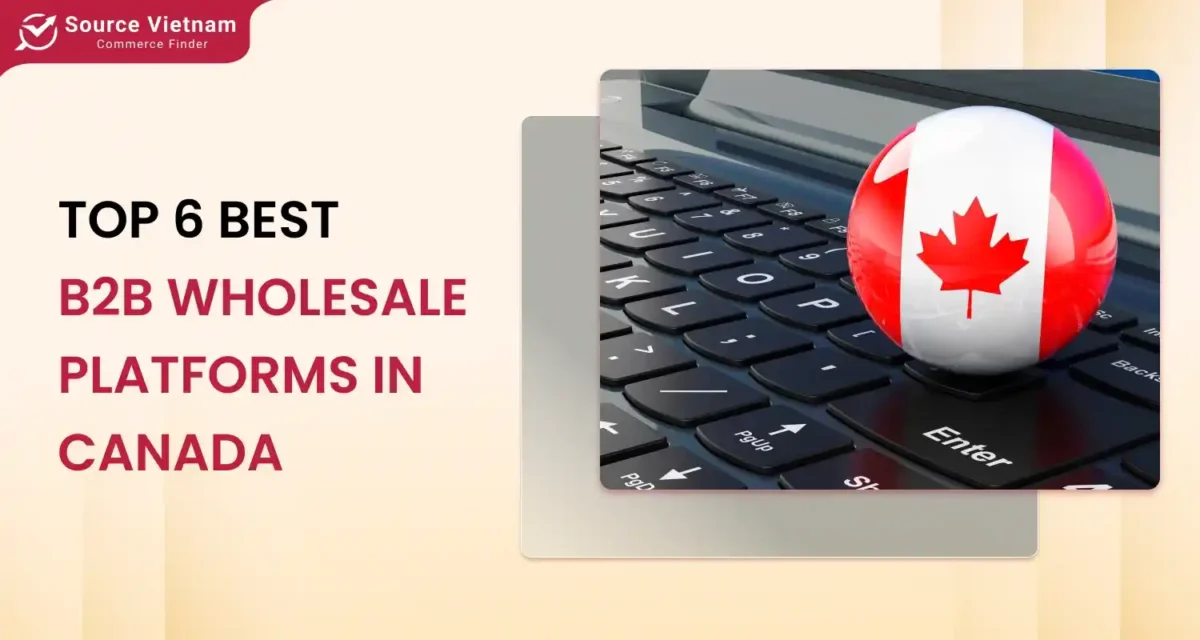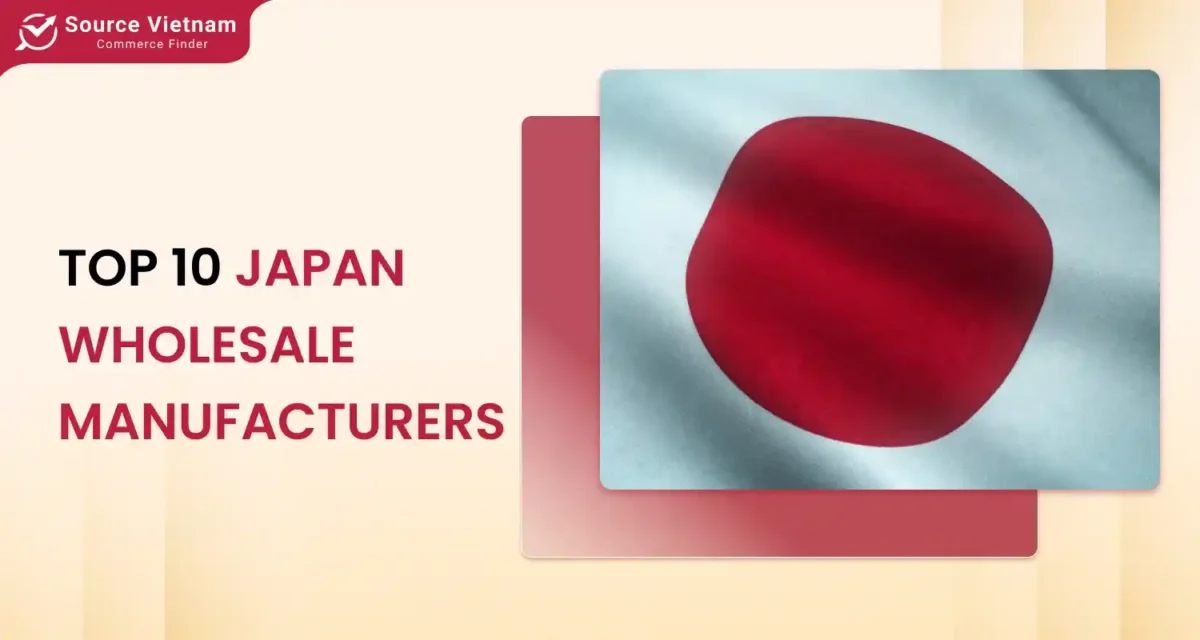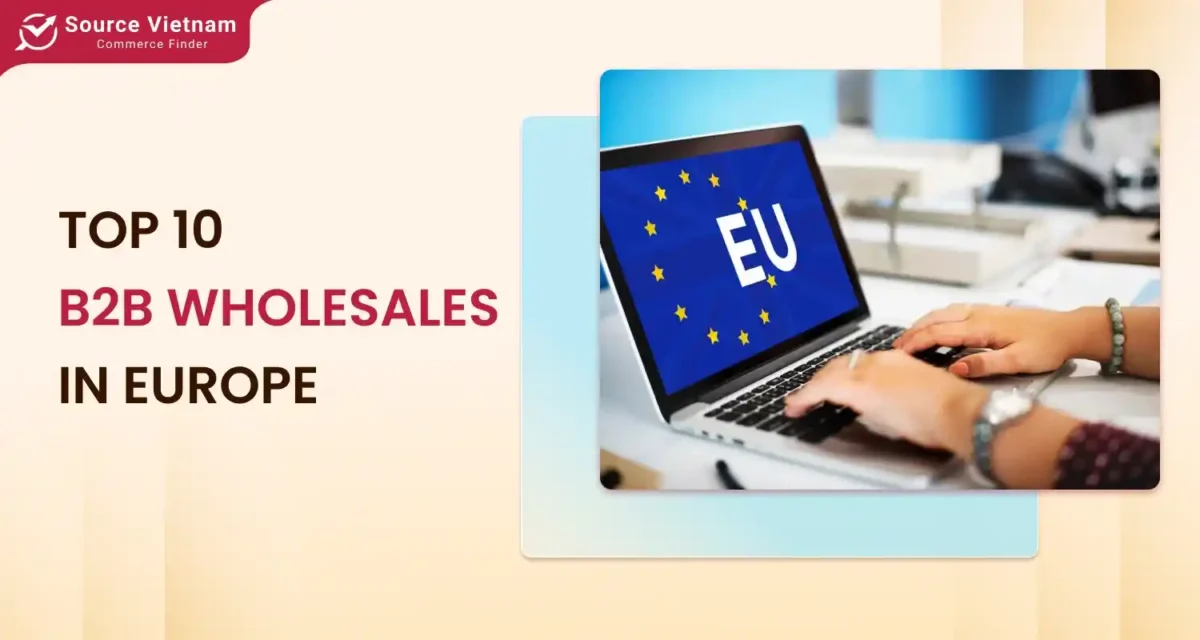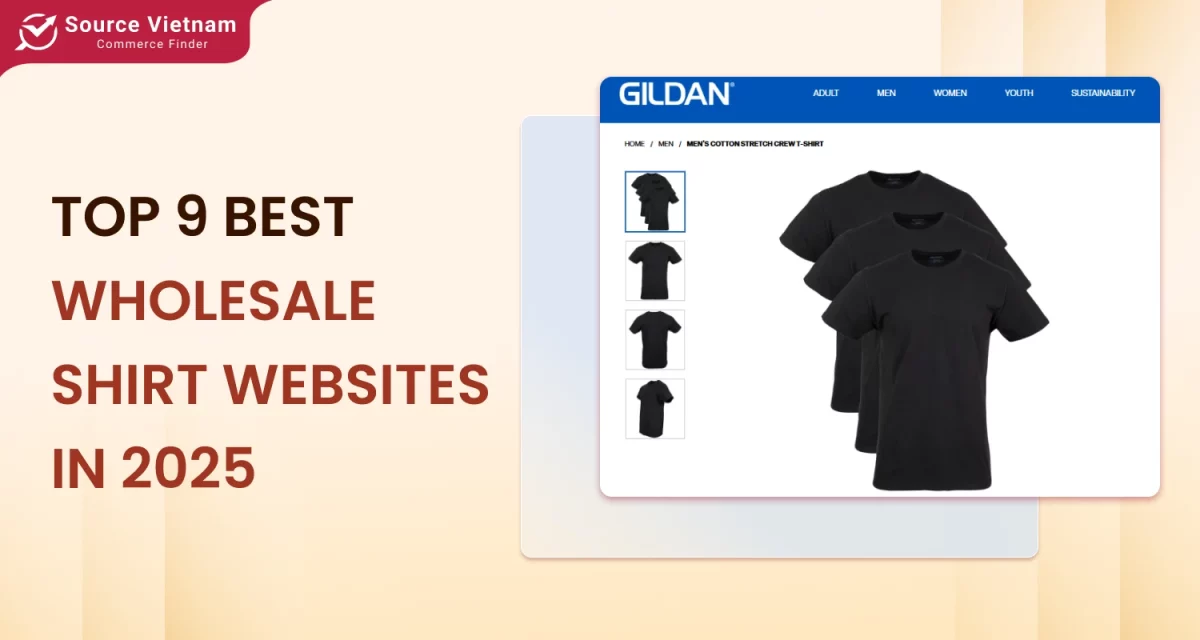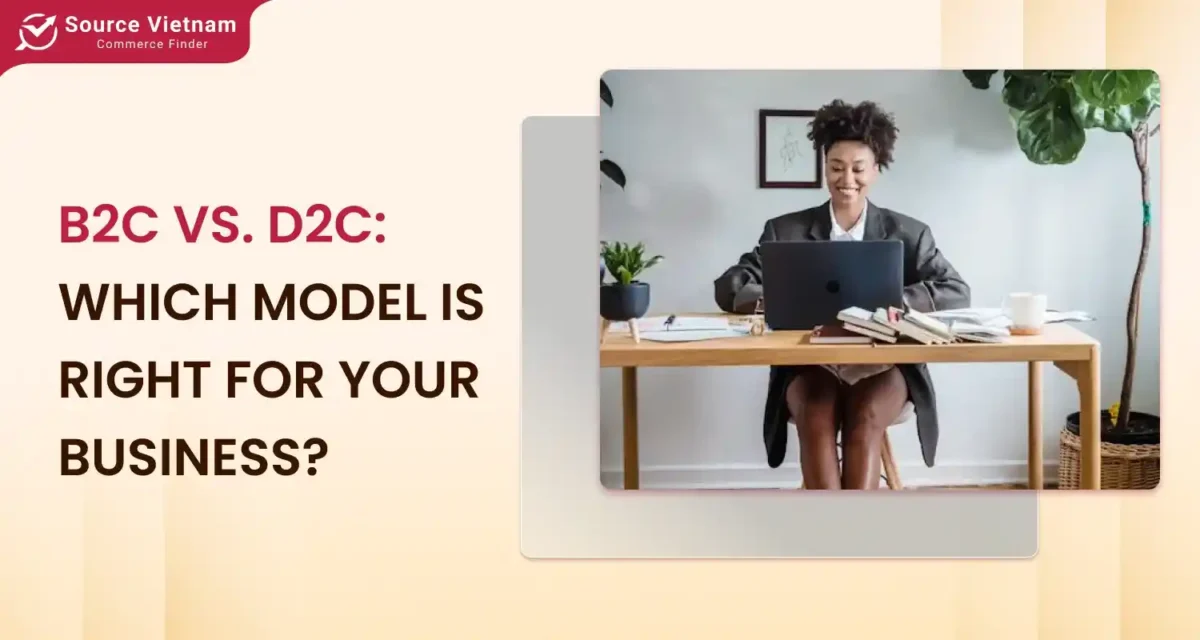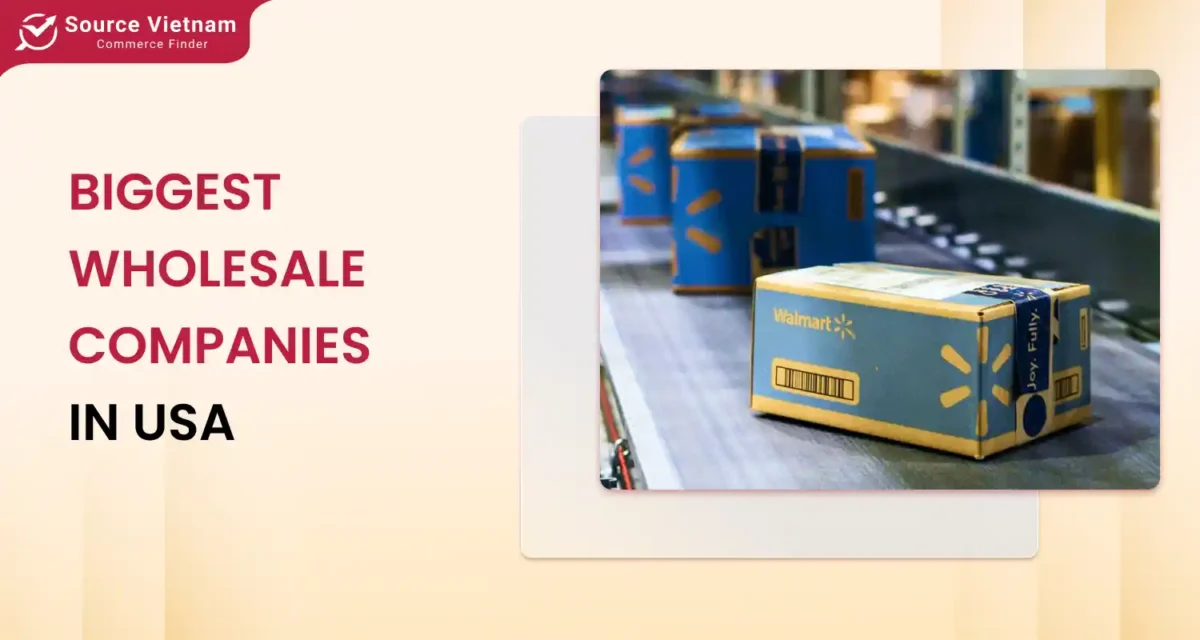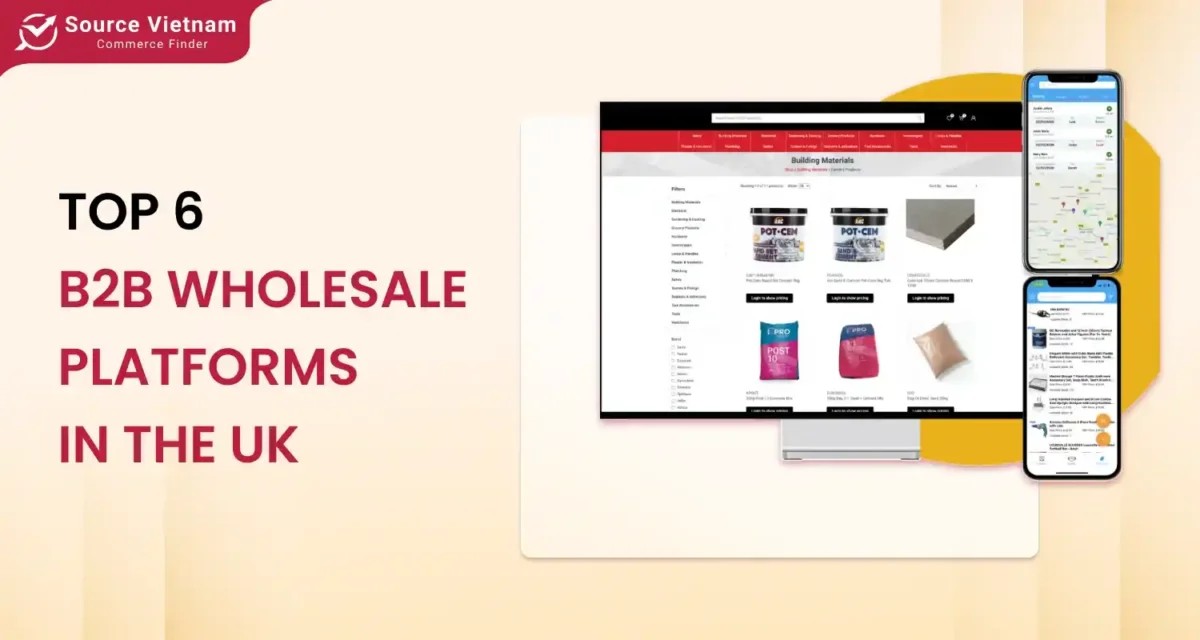B2B wholesale sells products to other businesses in bulk and at a discount. It’s a vast market, generating hundreds of billions of dollars in sales each month in the United States.
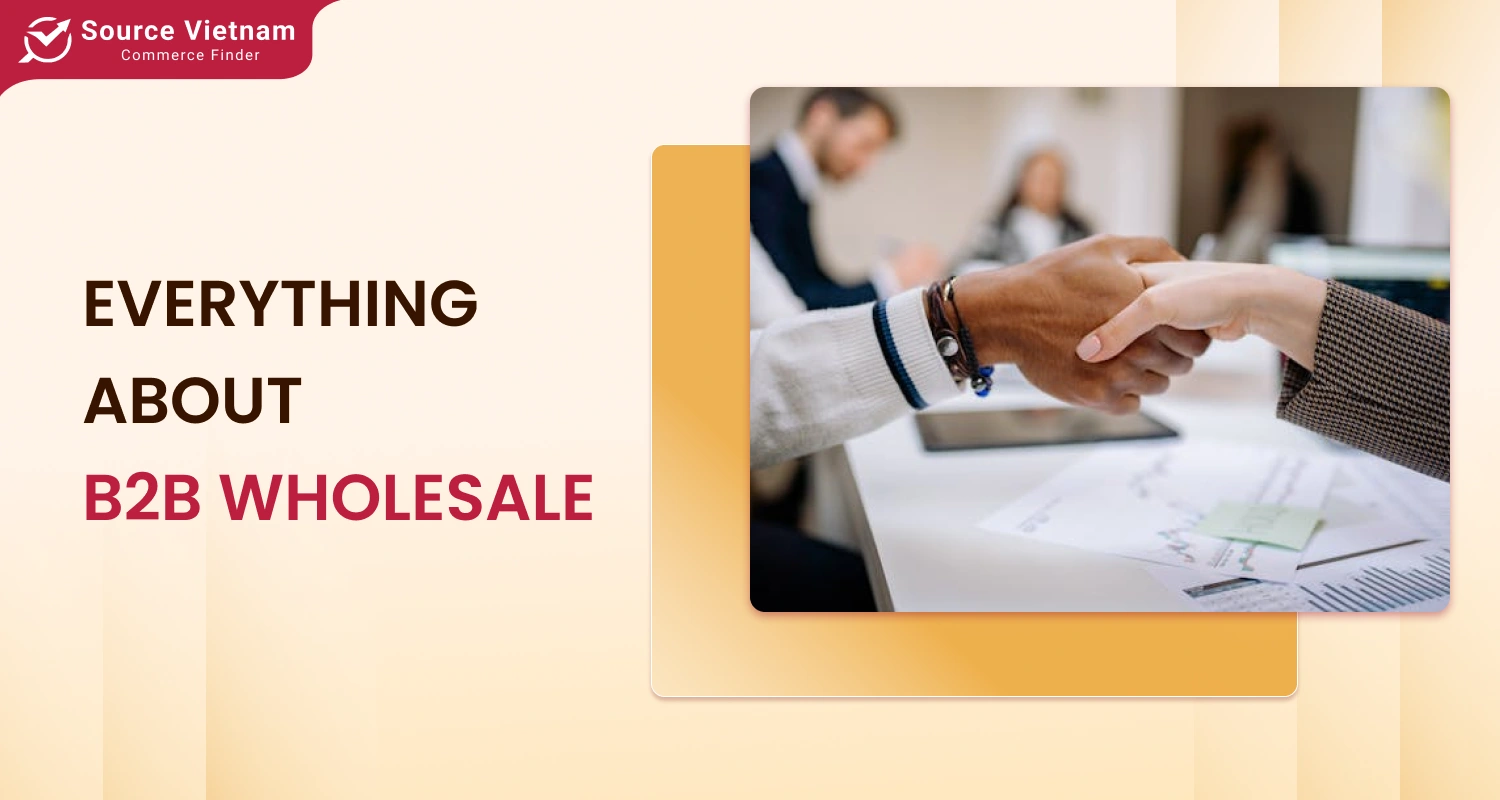
This post explains what is B2B wholesale and how it works. We’ll also provide tips for succeeding in the B2B wholesale platform, helping you save money, streamline operations, and drive business growth.
What is B2B wholesale?
B2B wholesale refers to selling products in bulk to other businesses rather than directly to consumers. Wholesalers usually purchase large quantities from manufacturers, store them in warehouses, and then sell smaller quantities at discounted prices to retailers or other companies.

By focusing on B2B sales instead of selling to individual consumers, wholesalers can increase their sales volume and the average size of each order. Since wholesalers often carry products from various manufacturers, they provide a one-stop solution for businesses to stock up on inventory.
Read more: What is B2B? Understanding Key Concepts and Examples
How does B2B wholesale work and the wholesale distribution model?
The most common type of wholesale is between manufacturers and retailers. However, some wholesalers sell to other wholesalers, and wholesalers like Costco — wholesale directly to consumers.
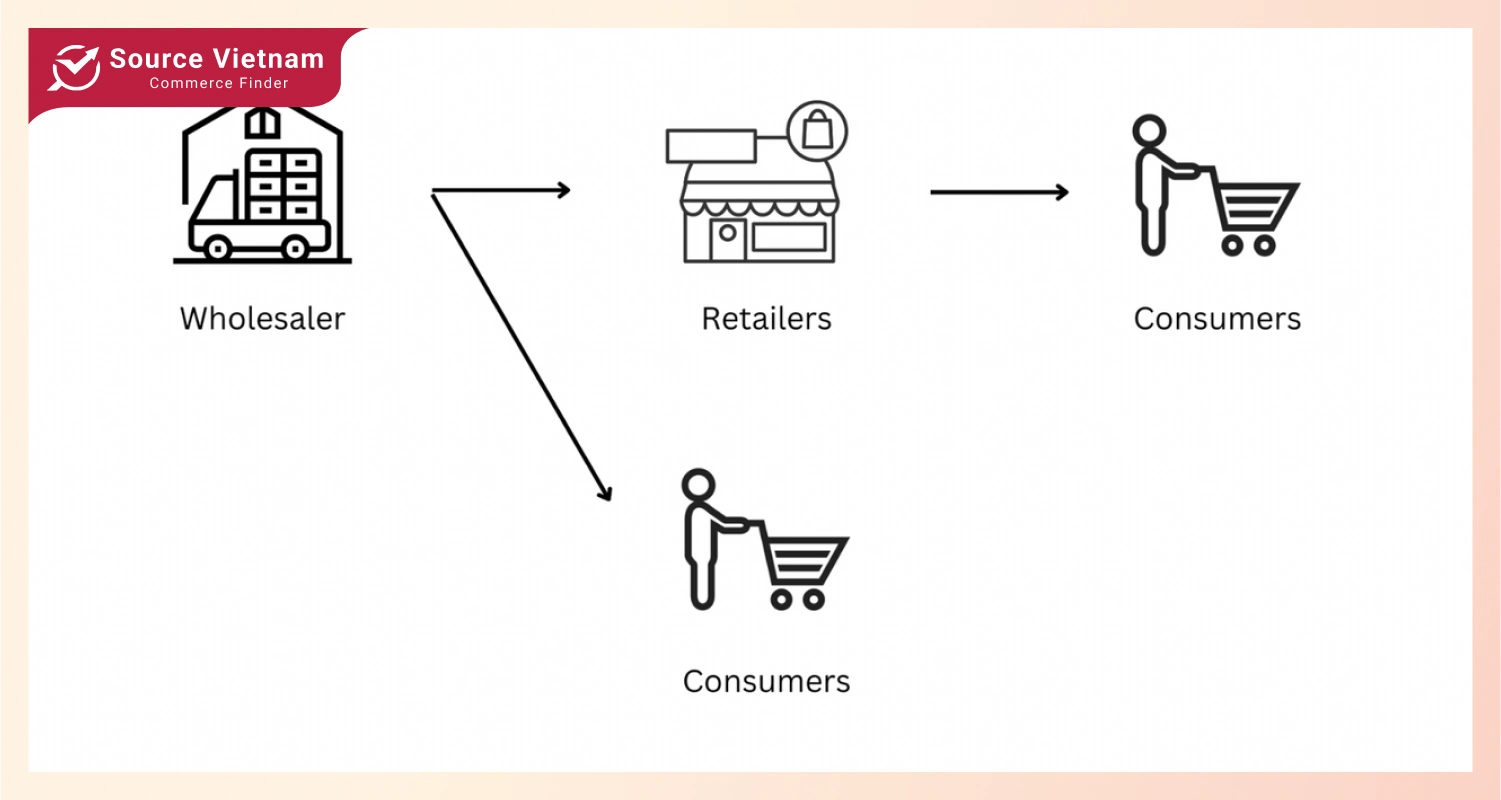
Wholesale is often considered a traditional sales channel with a less-than-ideal buying experience. However, technology and changing B2B buyer behavior have driven a shift in wholesale distribution.
Today, retail businesses use wholesale to drive growth without high capital investment or risk. With the right B2B e-commerce tools, companies can automate many tasks, from customer registration to checkout, with features like wholesale-specific pricing and outsourced fulfillment.
Read more: Top 11 B2B Wholesale Platforms: Find Your Perfect Partner
Examples of different types of B2B wholesale transactions
Here are a few examples of different types of B2B wholesale transactions:
- A Vietnamese textile manufacturer supplies fabrics in bulk to a US clothing company. The clothing company uses these textiles to create their fashion lines, which are later sold to consumers. This B2B wholesale transaction allows the manufacturer to focus on producing high-quality materials while the US brand designs and markets the final products, catering to fashion-conscious shoppers in the retail market.
- An electronics wholesaler in China purchases large quantities of smartphones from various manufacturers and resells them to European retail stores. The retail stores then sell these devices to individual customers.
3 Benefits of Wholesale B2B for small businesses
Buying in bulk saves money
B2B wholesalers, especially B2B wholesale for small businesses, buy products in large quantities at a lower price so they can sell them to other businesses at a better price. This means companies can save money when buying from wholesalers.
Easier supply chains
Wholesalers keep products in stock and handle shipping, making things easier for the businesses that buy from them. This reduces paperwork and lets companies focus on their main work.
Plus, wholesalers often have good connections with manufacturers, so businesses can count on always getting the products they need.
More product choices
The wholesale B2B platform gives businesses access to various products, including unique or hard-to-find items. This is especially helpful for businesses that want to source products from places like Vietnam, with many options.
By working with wholesalers, businesses can offer more products to their customers and stand out from their competitors.
4 Challenges of B2B wholesale and how to avoid them
B2B wholesale offers significant advantages, but navigating the process also comes with its own set of hurdles. Let’s explore some common challenges and how to tackle them:
Inventory management
Like at a grocery store, wholesalers must keep the right stock. Too little can lead to missed sales and unhappy customers, while holding onto too much can tie up valuable resources. Here’s how to strike a balance:
- Demand forecasting: Analyze past sales data and industry trends to predict future needs.
- Inventory management software: Utilize software to track stock levels, automate reordering, and prevent overstocking.
Building relationships with reliable distributors
Finding trustworthy distributors is crucial for securing quality products and consistent supply. Here are some tips:
- Industry associations: Join industry associations or attend trade shows to network with potential partners.
- Online directories: Utilize online directories and platforms like Alibaba or SourceVietnam.com to find verified suppliers.
- References: Ask for references from existing customers to gauge the distributor’s reputation.
Quality control
Maintaining product quality is essential for customer satisfaction and brand reputation. Here’s how to mitigate risks:
- Supplier verification: Utilize platforms like SourceVietnam.com’s supplier verification services to ensure the reliability of your chosen distributor.
- Product samples: Request product samples before placing large orders to assess quality firsthand.
- Quality inspections: Consider independent quality inspections for critical or high-value products.
Navigating supply chains
B2B transactions often involve complex international trade, adding another layer of complexity.
Here’s what to consider:
- Customs regulations: Research and comply with customs regulations for importing and exporting goods. This includes understanding tariffs, quotas, and any required documentation.
- Shipping logistics: Choose reliable shipping partners with experience handling your specific type of goods. Be aware of potential delays due to distance or customs clearance.
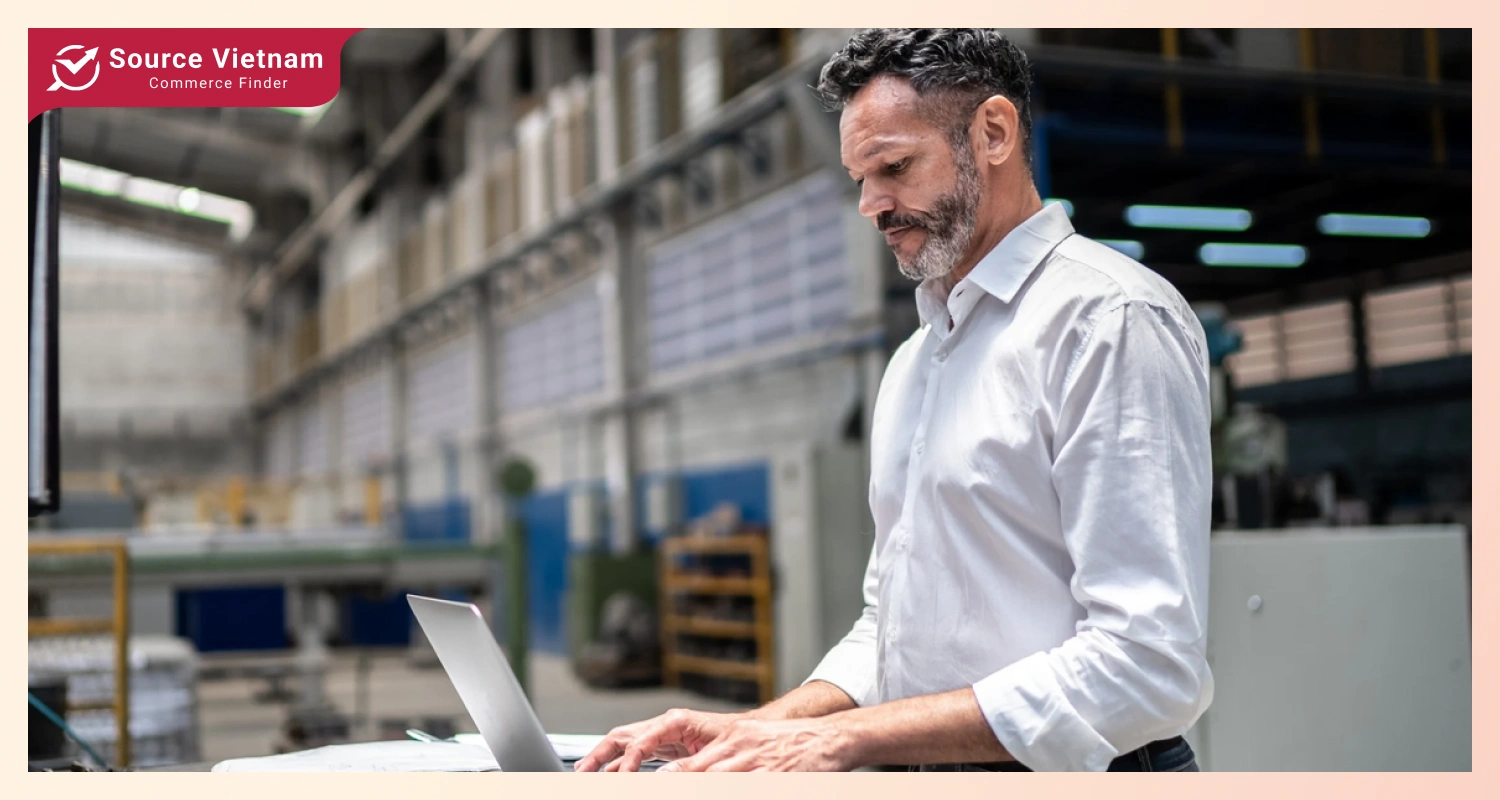
Key differences of B2B Wholesale vs. retail
B2B wholesale and retail are two different ways of selling products, and they differ in essential areas like pricing, order size, and customer relationships.
Pricing models
In B2B wholesale, businesses sell in large quantities to offer better prices. These prices are often negotiated based on things like how much the customer is buying and how often they place orders. This means buyers can get big discounts, and there may even be exceptional price levels depending on how much they buy.
On the other hand, retail has set prices that don’t change much and are aimed at individual shoppers to profit on each sale.
Sales volume
B2B platforms for wholesale usually involve large orders because businesses need more products to run their operations. These bigger orders can make fulfilling them more complex, and businesses need to focus more on managing their supply chains.
Retail sales, however, are usually smaller and meant for customers buying one or a few things to meet their immediate needs.
Customer relationships
B2B relationships are usually long-term and built on trust. Wholesale businesses focus on creating strong partnerships and giving great customer service. This can include having account managers who handle specific clients, offering customized solutions, and providing ongoing support.

In retail, the relationship is more about making individual sales. Retailers still care about customer satisfaction but focus more on getting customers to return through loyalty programs and marketing rather than building deep, ongoing relationships.
In short, the B2B wholesale marketplace deals with larger order sizes, flexible pricing, and long-term relationships, while retail is more about set prices, smaller purchases, and one-time transactions. Knowing these differences can help businesses choose the right approach for their needs and goals.
Read more: What Is the Key Difference Between Wholesale and Retail?
How to find B2B wholesale platform distributors?
Tips for locating and evaluating suppliers
- Define your needs: Clearly identify the products, minimum order quantity (MOQ), and delivery timelines you require. This targeted approach saves time and helps you find suppliers meeting your specific criteria.
- Leverage your network: Utilize your existing network for referrals. Talk to colleagues, industry contacts, and current vendors. Their recommendations can be a great source of verified B2B wholesale suppliers.
- Explore online resources: Utilize online directories like ThomasNet, Global Sources, and, for verified Vietnamese suppliers, SourceVietnam.com. These platforms provide information on suppliers, product categories, and even reviews from other businesses.
Read more: Top 10 B2B Wholesales in Europe & Tips To Build Partnership
Utilizing online platforms
- Industry-specific marketplaces: Platforms like Alibaba for global trade and Amazon Business for established brands offer a vast selection of B2B wholesale platform suppliers. These platforms allow you to compare prices, product specifications, and supplier performance ratings, making informed decisions.
- Regional marketplaces: Platforms like SourceVietnam specialize in connecting businesses with verified Vietnamese suppliers. This can be particularly valuable if you’re looking for specific products or manufacturers from Vietnam.
Due diligence is key
Never underestimate the importance of thorough background checks:
- Verify credentials: Confirm the supplier’s business license, tax ID, and industry certifications (if applicable).
- Review financial stability: Assess the supplier’s financial health to ensure they can reliably fulfill orders.
- Ask for references: Request references from other businesses who have worked with the supplier.
- Sample the goods: Order product samples to evaluate quality and ensure they meet your expectations.
SourceVietnam.com is the best B2B Wholesale platform and stands out as a reliable resource for businesses seeking verified Vietnamese suppliers. They focus on quality control and ensure listed suppliers are legitimate businesses with a proven track record. SourceVietnam can simplify your search by offering industry-specific categories and facilitating direct communication with potential partners.
Read more: SourceVietnam.com assists Vietnamese Enterprises and OCOP Entities in Cross-border export
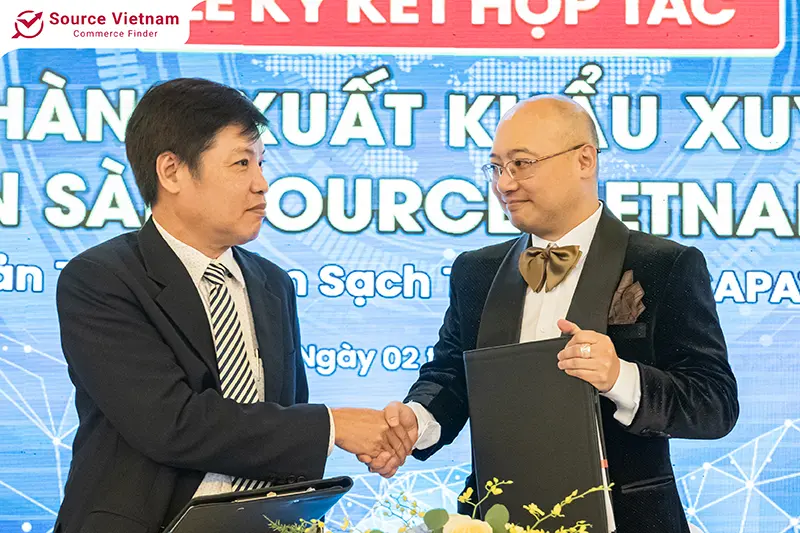
5 Tips for Succeeding in Wholesale B2B Marketplace
Cultivating long-term relationships
Building strong, lasting partnerships with suppliers is a key factor in the success of any Wholesale B2B operation. To create and nurture these relationships, it’s essential to prioritize trust by maintaining open and honest communication from the beginning.
Negotiating favorable terms
Effective negotiation is crucial in the B2B wholesale platform. Start by understanding different pricing models and negotiation tactics so you’re well-prepared. Larger order quantities often translate into better discounts and more favorable payment terms, so leveraging volume can be a powerful tool.
Cultural differences can influence negotiations, so it’s important to be respectful and adaptable when dealing with suppliers from different backgrounds. Ultimately, aim for a win-win outcome where both parties feel they’ve benefited from the agreement.
Optimizing logistics and supply chain
Smooth logistics and an efficient supply chain are vital for minimizing costs and ensuring timely deliveries. When choosing shipping methods, consider cost, speed, and reliability to make the best choice for your business.
Implementing a strong inventory management system, such as software tracking stock levels in real-time, can help prevent shortages and overstocking. Partnering with a reliable logistics provider with expertise in your industry ensures smooth operations while planning for potential disruptions—such as natural disasters or supply chain bottlenecks—through risk mitigation strategies helps protect your business.
Understanding cultural differences
Cultural awareness plays a big role in the success of international B2B relationships. Researching the cultural norms of your suppliers’ countries can help you avoid misunderstandings and build stronger partnerships. It’s essential to respect cultural differences and not make assumptions about how others do business.
Sometimes, working with a cultural intermediary can smooth communication and bridge gaps. Adjust your business approach to accommodate different cultural styles, which can enhance collaboration.
Leveraging technology for efficiency
Technology can be a powerful enabler in streamlining B2B wholesale operations. E-commerce platforms designed for B2B transactions simplify buying and selling, while supply chain management software helps track orders, inventory, and shipments in real-time, improving overall efficiency.
Communication tools like video conferencing and messaging apps enable quick and clear interactions, keeping everyone on the same page. Additionally, leveraging data analytics allows you to identify trends, optimize processes, and make informed decisions that can drive business success.
Conclusion
In conclusion, what is B2B wholesale? It’s the process of businesses purchasing goods in bulk from suppliers to sell to other companies. To succeed, focus on cultivating long-term supplier relationships, negotiating favorable terms, and optimizing logistics and supply chains. Cultural awareness is essential in today’s global business environment, and leveraging technology can streamline operations and enhance decision-making.
FAQs
What sets B2B wholesale apart from traditional retail sales?
B2B wholesale focuses on selling products in large quantities directly to other businesses, usually at a lower price per unit. This bulk purchasing is intended for resale or large-scale use. In contrast, traditional retail sales (B2C) involve selling individual products directly to consumers at a higher retail price. B2B wholesale often involves negotiated terms, minimum order quantities, and longer-term supplier relationships, whereas retail sales typically involve single transactions with end-users.
What types of businesses typically engage in B2B wholesale?
Businesses such as manufacturers, distributors, and wholesalers commonly participate in B2B wholesale. They supply products to retailers, other wholesalers, or businesses requiring large quantities of goods.
How is B2B wholesale evolving with e-commerce?
E-commerce has significantly transformed B2B wholesale, enabling businesses to conduct transactions online, streamline operations, and reach a global customer base more efficiently. This shift has led to development of specialized B2B e-commerce platforms that facilitate bulk ordering, customized pricing, and integrated supply chain management.
Who can participate in B2B wholesale transactions?
The B2B wholesale platform is designed for businesses like retailers, distributors, and manufacturers. Any business that purchases goods for resale or large-scale use can engage in B2B wholesale.
How can a business start purchasing through a B2B wholesale platform?
To begin with the Wholesale B2B platform, businesses typically need to establish relationships with wholesalers, obtain a business license, and meet any minimum order requirements set by the supplier.

